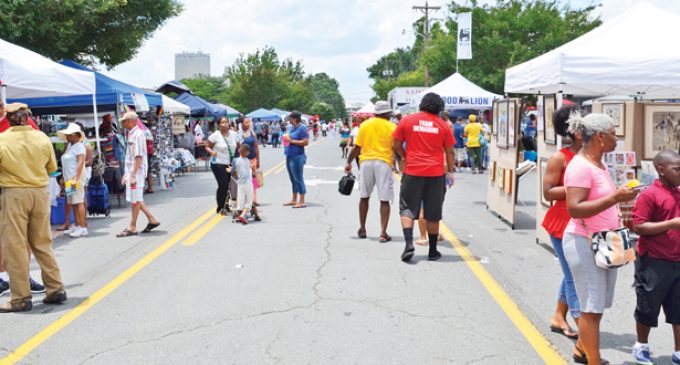Juneteenth festival-goers mark black freedom amid mourning for slain church members

In photo above: Fifth Street was lined with vendors for Juneteenth in Winston-Salem on Saturday, June 20. (Photo by Todd Luck)
Even in the face of national tragedy, Juneteenth was celebrated around the country this past weekend with the local celebration taking place Saturday, June 20, on Fifth Street.
Juneteenth celebrates the end of slavery and is held on or around June 19 commemorating the day Union forces arrived in Galveston, Texas, with news that slavery was over in 1865.
Before reading a Juneteenth proclamation, City Council Member Derwin Montgomery addressed the shooting on June 17 when a young white gunman killed nine African-Americans at Emanuel African Methodist Episcopal Church in Charleston, S.C. Montgomery said “even on a day of celebration, the nation grieves for the victims in that racially motivated shooting.”
“As we celebrate this day and what this day means to the African-American community in this nation, we also struggle and wrestle with the fact of the wounds that are still open and that we still deal with today that are tied to the racial issues that we have within this country,” he said.
Montgomery said the black community must continue pushing forward until “we reach a place where black is looked at as something truly valued by all.”
Juneteenth transformed the section of Fifth Street in front of the old Winston Mutual Building into a festival with vendors food, jewelry, crafts, clothes and other wares. There were a number of musical performances on the events stage, including Big Four Choir, which is made of alumni from the city’s four historically black high schools, and Dion Owen and the Renaissance Choir.
The event’s main speaker was the Rev. Byron Williams, a nationally syndicated columnist and author, who discussed the 13th, 14th and 15th amendments that became the foundation of freedom for African-Americans by abolishing slavery, giving them citizenship, allowing black men to vote and ensuring states could not take away those rights.
He said it was the right to vote for minorities that led John Wilkes Booth to assassinate President Abraham Lincoln. Williams said in many ways that makes Lincoln the first civil rights martyr.
But he was far from the last as Jim Crow laws would continue to oppress blacks, and the Civil Rights Movement fought for racial equality.
Williams called the treatment of African-Americans the “index of America’s morality.”
“Whenever America goes through its ongoing struggle for redemption, it must go through black suffering to achieve it. There’s simply no way around it,” he said.
After his remarks, Williams said that black suffering continues today with recent events involving police brutality toward African-Americans and the church shooting. He said the country gets excited about incidents that make national headlines, but then the protests go away.
“Today, we’re more of a microwave society; we’re hot for a moment and then we cool down,” he said.
He said that “Black Live Matters” is a fine slogan most would agree with, but it’s vague and not specific in its demands. What’s needed is a sustained, grassroots movement with clear, specific goals like the Civil Rights Movement, and he’s hopeful one might emerge soon.
Williams wrote the bestseller “1963: The Year of Hope and Hostility,” which won the 2014 International Book Award for US History.
Williams, the former pastor of Resurrection Community Church in Berkeley, California, recently moved to Winston-Salem and founded the Kairos Moment, a progressive theological think tank that focuses on poverty.
Juneteenth is regularly a source of activism. The Nation of Islam’s table was signing up people for the Million Man March. Right beside them, the NAACP was gearing up for it’s own Winston-Salem march on July 13 in connection with the federal court trial, NC NAACP v. McCrory, challenging North Carolina’s new voting laws, which the group says supresses minority votes.
Juneteenth is also a place for history. The New Winston Museum premiered its memory maps of East Winston, inviting attendees to write memories that happened at places around town. Triad Cultural Arts, which sponsors the Juneteenth festival, had a booth collecting recollections of students, teachers and parents at the city’s historically black elementary schools.
On the hot summer day, attendees set up lawn chairs and even a table underneath a covered Bank of America ATM next to the stage. When she wasn’t on stage singing with the Big 4 choir, Sheila Smith could be found there taking it all in. A former member of the Juneteenth planning committee, she said the local celebration has grown over the years, and remains a great way to learn about history and fellowship with others. She said even in trying times, Juneteenth is always a day of celebration.
“It gives a lot of younger people exposure to what our ancestors went through and where we are now,” she said.











